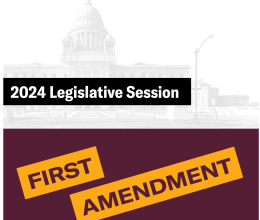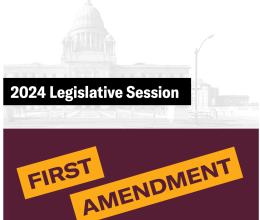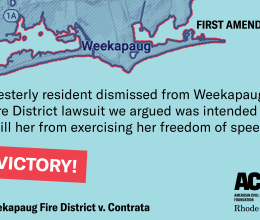Three local groups concerned about freedom of the press and the public’s right to know today criticized R.I. Attorney General Patrick Lynch for refusing to join with 34 fellow Attorneys General –- including those in Connecticut, Maine, Massachusetts and Vermont – who last week filed a brief in the U.S. Supreme Court in support of the appeal of journalists Judith Miller and Matthew Cooper. These two nationally respected journalists are facing contempt of court sentences for refusing to reveal sources in response to a federal grand jury subpoena.
In a letter to Lynch, the three organizations – ACCESS/RI, the R.I. Press Association and the R.I. ACLU – noted that the Supreme Court appeal “raises issues of enormous significance in terms of the public’s right to know. Our state, of course, is as familiar as any with the critical importance of this issue in light of the recent release from home confinement of news reporter Jim Taricani for his similar refusal to reveal a source in federal proceedings. We thus would have expected you to join with so many of your colleagues in urging review of Miller and Cooper’s appeal, for this is far from an abstract constitutional issue for Rhode Islanders.”
The letter noted that Rhode Island has had a reporter’s shield law since 1971, but “the lack of any corresponding federal privilege renders that state protection ineffectual in many circumstances, which is why this case is so significant.”
The Attorneys-General brief argues that a lower court decision, which refused to find any federal reporters’ privilege corresponding to the privileges that Rhode Island and 48 other states now have, “undermines both the purpose of the shield laws and the policy determinations of the State courts and legislatures that adopted them.” Without taking a specific position on the scope of a federal privilege, all 34 Attorneys-General agreed that “some form of a reporter’s privilege grounded in federal common law is appropriate.”
The letter expressed “profound disappointment” that Lynch would “stand silent when so many other [Attorneys General] across the country have recognized the crucial significance of this pending court case in allowing citizens to be able to better make informed political, social and economic choices.” The letter added that the recent “dramatic revelation about Woodward and Bernstein’s ‘Deep Throat’ source – a source who can truly be said to have changed the course of American history – is particularly timely as a glaring reminder of just how essential shield laws are for the promotion of the public good.”
The three groups called on Lynch to reconsider his decision “to sit on the sidelines” should the Supreme Court agree to hear this case, saying that the issues at stake “are too weighty to be ignored.”




